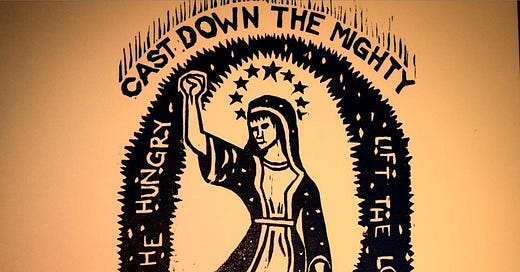In her great magnificat, Mary proclaims in explicit language that the mission of God in the world includes scattering the proud, casting down the mighty, and sending the rich away empty.
We would be wrong to see this solely as a spiritual metaphor. Throughout Scripture, God constantly reveals his concern for the poor and lowly and his anger towards those who abuse them. The messianic mission of God includes a great reversal, where the first are last and the powerful are cast down.
If this is God's mission in the world, then it is also our mission. We—as baptized priests, prophets and kings, as other Christs—are the body of Christ in the world exercising his power to bring about his Kingdom.
Part of what it means to be Christian is to prevent the rich and powerful from abusing others, even if that means removing them from power.
As Pope Francis says in Fratelli Tutti:
"We are called to love everyone, without exception; at the same time, loving an oppressor does not mean allowing him to keep oppressing us, or letting him think that what he does is acceptable.
On the contrary, true love for an oppressor means seeking ways to make him cease his oppression; it means stripping him of a power that he does not know how to use, and that diminishes his own humanity and that of others."
He has mercy on those who fear Him
In every generation.
He has shown the strength of His arm,
He has scattered the proud in their conceit.
He has cast down the mighty from their thrones,
And has lifted up the lowly.
He has filled the hungry with good things,
And the rich He has sent away empty.
(Luke 1:50-53)
Dietrich Bonhoeffer Gave this sermon for the Third Sunday of Advent (December 17, 1933):
This song of Mary’s is the oldest Advent hymn. It is the most passionate, most vehement, one might almost say, most revolutionary Advent hymn ever sung.
It is not the gentle, sweet, dreamy Mary that we so often see portrayed in pictures, but the passionate, powerful, proud, enthusiastic Mary, who speaks here. None of the sweet, sugary, or childish tones that we find so often in our Christmas hymns, but a hard, strong, uncompromising song of bringing down rulers from their thrones and humbling the lords of this world, of God’s power and of the powerlessness of men.
These are the tones of the prophetic women of the Old Testament: Deborah, Judith, Miriam, coming alive in the mouth of Mary.
[…]
There are only two places where the powerful and great in this world lose their courage, tremble in the depth of their souls, and become truly afraid. These are the manger and the cross of Jesus Christ.
No man of violence dares to approach the manger, even King Herod did not risk that. For it is here that thrones tumble, the mighty fall, and the high and mighty ones are put down, because God is with the lowly. Here the rich are nobodies, because God is with the poor and the hungry. “He fills the hungry with good things but has sent the rich away empty.”
Before the Virgin Mary, before the manger of Christ, before God in his lowly state, the rich have no rights and no hope. They are convicted. The proud man may think that nothing will happen to him today, yet tomorrow or the day after, it will happen. God brings down tyrants from their thrones. God lifts up the humble. For this purpose, Jesus Christ as the child in the manger, as the son of Mary, has come into the world.
Image Credit: Magnificat by Ben Wildflower




